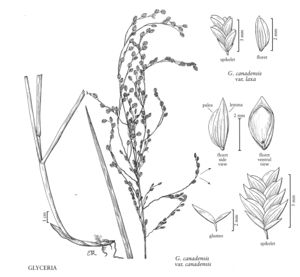familyPoaceae
subfamilyPoaceae subfam. Pooideae
genusGlyceria
sectionGlyceria sect. Striatae
speciesGlyceria canadensis
Difference between revisions of "Glyceria canadensis var. laxa"
Common names: Limp mannagrass
Synonyms: Glyceria laxa
Treatment appears in FNA Volume 24. Treatment on page 80.
FNA>Volume Importer |
FNA>Volume Importer |
||
| Line 7: | Line 7: | ||
|synonyms={{Treatment/ID/Synonym | |synonyms={{Treatment/ID/Synonym | ||
|name=Glyceria laxa | |name=Glyceria laxa | ||
| − | |authority= | + | |authority= |
| + | |rank=species | ||
}} | }} | ||
|hierarchy=Poaceae;Poaceae subfam. Pooideae;Poaceae tribe Meliceae;Glyceria;Glyceria sect. Striatae;Glyceria canadensis;Glyceria canadensis var. laxa | |hierarchy=Poaceae;Poaceae subfam. Pooideae;Poaceae tribe Meliceae;Glyceria;Glyceria sect. Striatae;Glyceria canadensis;Glyceria canadensis var. laxa | ||
| Line 19: | Line 20: | ||
-->{{Treatment/Body | -->{{Treatment/Body | ||
| − | |discussion=<p>Glyceria canadensis var. laxa grows in swamps, bogs, and wet woods, primarily along the eastern seaboard of North America from Nova Scotia to northeastern Tennessee. It is sometimes treated as a hybrid, G. xlaxa (Scribn.) Scribn., but several specimens have dehiscent anthers and well-formed caryopses, indicating that they are not hybrids. The report of 2n = 30 is based on counts for G. xottawaensis.</p> | + | |discussion=<p><i>Glyceria canadensis </i>var.<i> laxa</i> grows in swamps, bogs, and wet woods, primarily along the eastern seaboard of North America from Nova Scotia to northeastern Tennessee. It is sometimes treated as a hybrid, G. xlaxa (Scribn.) Scribn., but several specimens have dehiscent anthers and well-formed caryopses, indicating that they are not hybrids. The report of 2n = 30 is based on counts for G. xottawaensis.</p> |
|tables= | |tables= | ||
|references= | |references= | ||
| Line 28: | Line 29: | ||
-->{{#Taxon: | -->{{#Taxon: | ||
name=Glyceria canadensis var. laxa | name=Glyceria canadensis var. laxa | ||
| − | |||
|authority=(Scribn.) Hitchc. | |authority=(Scribn.) Hitchc. | ||
|rank=variety | |rank=variety | ||
| Line 36: | Line 36: | ||
|family=Poaceae | |family=Poaceae | ||
|illustrator=Cindy Roché | |illustrator=Cindy Roché | ||
| + | |illustration copyright=Utah State University | ||
|reference=None | |reference=None | ||
|publication title= | |publication title= | ||
|publication year= | |publication year= | ||
|special status= | |special status= | ||
| − | |source xml=https:// | + | |source xml=https://jpend@bitbucket.org/aafc-mbb/fna-data-curation.git/src/f50eec43f223ca0e34566be0b046453a0960e173/coarse_grained_fna_xml/V24/V24_92.xml |
|subfamily=Poaceae subfam. Pooideae | |subfamily=Poaceae subfam. Pooideae | ||
|tribe=Poaceae tribe Meliceae | |tribe=Poaceae tribe Meliceae | ||
Revision as of 21:25, 16 December 2019
Spikelets 3-5 mm, with (2)3-5 florets. Lower glumes 0.6-1.3 mm; upper glumes 1.5-2.3 mm, usually rounded, sometimes acute; lemmas 1.8-2.5 mm. 2n = 60.
Discussion
Glyceria canadensis var. laxa grows in swamps, bogs, and wet woods, primarily along the eastern seaboard of North America from Nova Scotia to northeastern Tennessee. It is sometimes treated as a hybrid, G. xlaxa (Scribn.) Scribn., but several specimens have dehiscent anthers and well-formed caryopses, indicating that they are not hybrids. The report of 2n = 30 is based on counts for G. xottawaensis.
Selected References
None.
Lower Taxa
None.
